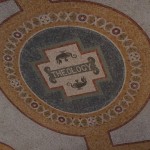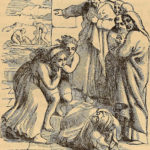We run our website the way we wished the whole internet worked: we provide high quality original content with no ads. We are funded solely by your direct support. Please consider supporting this project.

Who Curses the Earth?
After the “fall” of Adam and Eve in the Garden of Eden, their sin results in a five curses: on nature, on marriage, on human life, on the serpent, and on women during childbirth. Who is it exactly that afflicts the world with these curses? While the author speaks about the curses on nature (Gen 3:17-8), marriage (vs. 16b) and human life (vs. 19) in the passive voice, the curse on the serpent and on the woman during childbirth are attributed directly to God. “I will put enmity between you and the woman,” God says to the serpent (vs. 15). And to the woman he says, “I will make your pains in childbearing very severe” (vs. 16). One could thus argue that this narrative presumes that God is directly involved in cursing the world.
The apostle Paul seems to agree that it is God who brings the curse when he writes:
… the creation was subjected to frustration, not by its own choice, but by the will of the one who subjected it, in hope that the creation itself will be liberated from its bondage to decay and brought into the freedom and glory of the children of God (Rom 8:20-1).
Since the one who subjected creation “to frustration” did so “in hope that the creation itself will be liberated,” it seems clear that Paul is referring to God, not Satan. On this basis, Augustine and the majority of theologians throughout church history have concluded that all suffering is, directly or indirectly, a punishment of God either for the sin of Adam (“original sin”) or for one’s own sin.
On the other hand, Jesus and the Gospel authors consistently, and very explicitly, attributed all sickness, disease, deformities, disabilities and death to Satan and demons, not God. This same pattern of thought was uniformly followed by the early post-apostolic Church Fathers. All of Jesus’ “nature” miracles are best understood as symbolic acts of war against the diabolic force that has corrupted nature. Not only this, but the NT’s emphatic view of Satan as the “god of this age” and “principle ruler of the air” who “controls the entire world” and who holds power over nature as well as “the power of death” strongly suggests that it is Satan and his minions, not God, who curse the world with afflictions of every sort (See 2 Cor 4:4; Eph 2:2; 1 Jn 5:19; Heb 2:14).
What should we make of these differing perspectives? Of course, all who adopt Augustine’s deterministic conception of divine providence harmonize these differing perspectives by arguing that everything Satan and his minions do meticulously conforms to the will of God. But this view does not disclose how this dual way of depicting God in relation to the curse bears witness to the revelation of God on Calvary. It does not provide us with a way to understand the dual pattern of texts which both implicate God as the one who curses the earth while actually revealing that other agents are responsible for them.
If it is granted that the cross reveals a God who is altogether non-violent, then a cruciform interpretation of the curse that now afflicts the world would lead us to conclude that God is not in any way bringing about, or responsible for, the violence and suffering that this curse brings. To the contrary, in Christ we learn that God is on the other side of this violence and suffering inasmuch as he continually fights against them. The ones who are rather responsible for the violence and suffering that the curse brings are Satan, other rebel powers, and humans inasmuch as it was our act of pushing God away that opened the floodgates to these destructive agents and inasmuch as we continue to cooperate with the cosmic agents. Yet, while the Creator bears no culpability for this evil, he nevertheless graciously assumes responsibility for all of it on the cross. And in doing this he takes on the semblance of one who was guilty for what he merely allowed.
Thus the cross provides us a way of understanding the Scripture’s dual way of speaking about God and the curse, as biblical authors portray God as simultaneously both bringing and merely allowing various judgments to come on the earth and its inhabitants.
Photo via VisualHunt
Category: General
Tags: Cruciform Theology, The Fall
Topics: Interpreting Violent Pictures and Troubling Behaviors
Related Reading

The Ultimate Criteria for Theology
Theology is thinking (logos) about God (theos). It is a good and necessary discipline, but only so long as it is centered on Christ. All of our speculation and debate about such things as God’s character, power, and glory must be done with our focus on Jesus Christ—more specifically, on the decisive act by which…

Modern Theologians and the Centrality of Christ
During the twentieth century the development of a Christocentric reading of the Scriptures—which is crucial to understanding what I argue in Crucifixion of the Warrior God—surged in the wake of Karl Barth’s publication of his Romans commentary in 1916. It was justifiably described as a “bombshell” that fell “on the playground of the theologians,” demolishing…

The God Who Stoops
The way that one imagines God can be thought of along the lines of a Rorschach test. That is, I submit that the way a person imagines and experiences God says at least as much about that person as it does God. The more estranged people are from God, the more their knowledge of him is…

Podcast: Is Cruciform Hermeneutics Simply Midrash?
Greg considers whether Cruciform Hermeneutics is just a complicated way of seeing what I want to see in the text, and offers nuanced thought for our more complicated hermeneutical challenges. http://traffic.libsyn.com/askgregboyd/Episode_0307.mp3

Who Killed Ananias and Sapphira? A Response to Paul Copan (#6)
In his critique of Crucifixion of the Warrior God (CWG), Paul Copan makes a concerted effort to argue that the God revealed in Jesus Christ and witnessed to throughout the NT is not altogether non-violent. One of the passages Copan cites against me is the famous account of Ananias and Sapphira falling down dead immediately…

If Jesus Is the Whole Point, Then What’s the Point of the Old Testament? (podcast)
Greg considers the role of the Old Testament in Christian faith. Episode 554 http://traffic.libsyn.com/askgregboyd/Episode_0554.mp3
